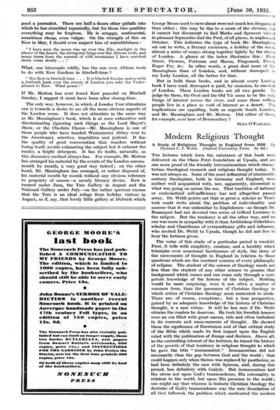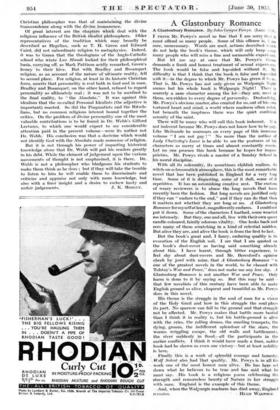Modem Religious Thought
A. Study of Religious Thought in England from 1850. By Clement C. 3; Webb. (Oxford University Press. 8s. 6d.)
THE lectures which form the substance of this book were delivered on the Olaus Petri foundation at Upsala, and are one more proof of the friendly internationalism which charac- terizes theological research and religious thought today. It was not always so. Some of the most influential of nineteenth- century theologians, both in Germany and England, were neither well acquainted with, nor, apparently, interested in what was going on across the sea. That tradition of national or ecclesiastical self-sufficiency has not altogether passed away. Dr. Webb points out that so great a scholar as Troel- tsch could write about the problem of individuality and assume that it was unfamiliar to Englishmen—as though Dr. Bosanquet had not devoted two series of Gifford Lectures to the subject. But the tendency is all the other way, and no one was more in sympathy with it than Archbishop Saderblom, scholar and Churchman of extraordinary gifts and influence, who invited Dr. Webb to Upsala, though he did not live to hear the lectures given.
The value of this study of a particular period is twofold. First, it tells with simplicity, candour, and a lucidity which triumphs over occasional harshnesses of style, the story of the movements of thought in England in relation to those questions which are the constant concern of every philosophy of religion. The student of the science of theology needs not less than the student of any other science to possess that background which comes and can come only through a com- petent knowledge of the history of the subject. Nothing would be more surprising, were it not often a matter of common form, than the ignorance of Christian theology in which critics of Christian theology seem contented to abide. There are, of course, exceptions ; but a true perspective, gained by an adequate knowledge of the history. of Christian thought, is a rare virtue. It will be less rare if Dr. Webb obtains the readers he deserves. He took his Swedish hearers over an era filled with great names, rich and often turbulent in its currents and cross-currents of thought.. He showed them the signficance of Darwinism and of that critical study of the Bible which made its first impact upon the English mind with the publication of Essays and Reviews. Above all, as the controlling interest of the lectures, he traced the history of the growth of that tendency in religious thought to which he gave the title " immanentist." Immanentism did not necessarily close the gap between God and the world ; that could happen only when theism was replaced by pantheism, as had been definitely the case with Spinoza, and, during this period, less definitely with Carlyle. But imrnanentism laid the stress not upon God's transcendence, His externality in relation to the world, but upon His presence in the world ; one might say that whereas in historic Christian theology the doctrine' of God's- ttanseetidence was the sure' foundation of all that followed, the problem which confronted the modern
Christian philosopher was that of maintaining the divine transcendence along with the divine immanence.
Of great interest are the chapters. which deal with the religious influence of the British idealist philosophers. Older representatives of the tradition which may. .broadly be described as Hegelian, such as T. H. Green and Edward Caird, did not subordinate religion to metaphysics. Indeed, it was to Green that the theologians of the Anglo-Catholic school who Wrote Lux Mundi looked for their philosophical basis, carrying off, as Mark Pattison acidly remarked, Green's honey to their hive. . But with 'Bradley and Bosanquet religion, as an account of.the nature of ultimate reality, fell to second place. For religion, at least in its historic Christian form, asserts that personality is real both in God and in man. Bradley and Bosinquet; on the other. hand, refused to regard personality as ultimately real ; it was not to be ascribed to the final reality, to "the Absolute." It was against this idealism that the so-called Personal Idealists (the adjective is important) reacted. ' So 'did the Prigniatists andtlie Kitsch- Bans, but no common religious interest bound together the critics: On the problem of divine personality-one of the most valuable contributions is to be found in Dr. Webb'S Gifford Lectures, to which one would. expect to see considerable attention :paid in . the present volunie--were its 'author not Dr. Webb.` His conclusion was that a doctrine which would not identify God with the Absolute made nonsense of religion.
But it is not through his power of imparting historical knowledge alone that Dr.. Webb Will put his readers greatly in his debt: While thi eleinent of judgement upon the Virions movements of thought is not emphasized, .. it is there... Dr. Webb is not a philosopher who bludgeons' his students to make them think as he dOes ; but if they will take the trouble to listen to him. he will enible• them to discriminate and criticize and appraise not only -with more . knowledge, but also with a -finer insight and a desire to eschew hasty and











































 Previous page
Previous page